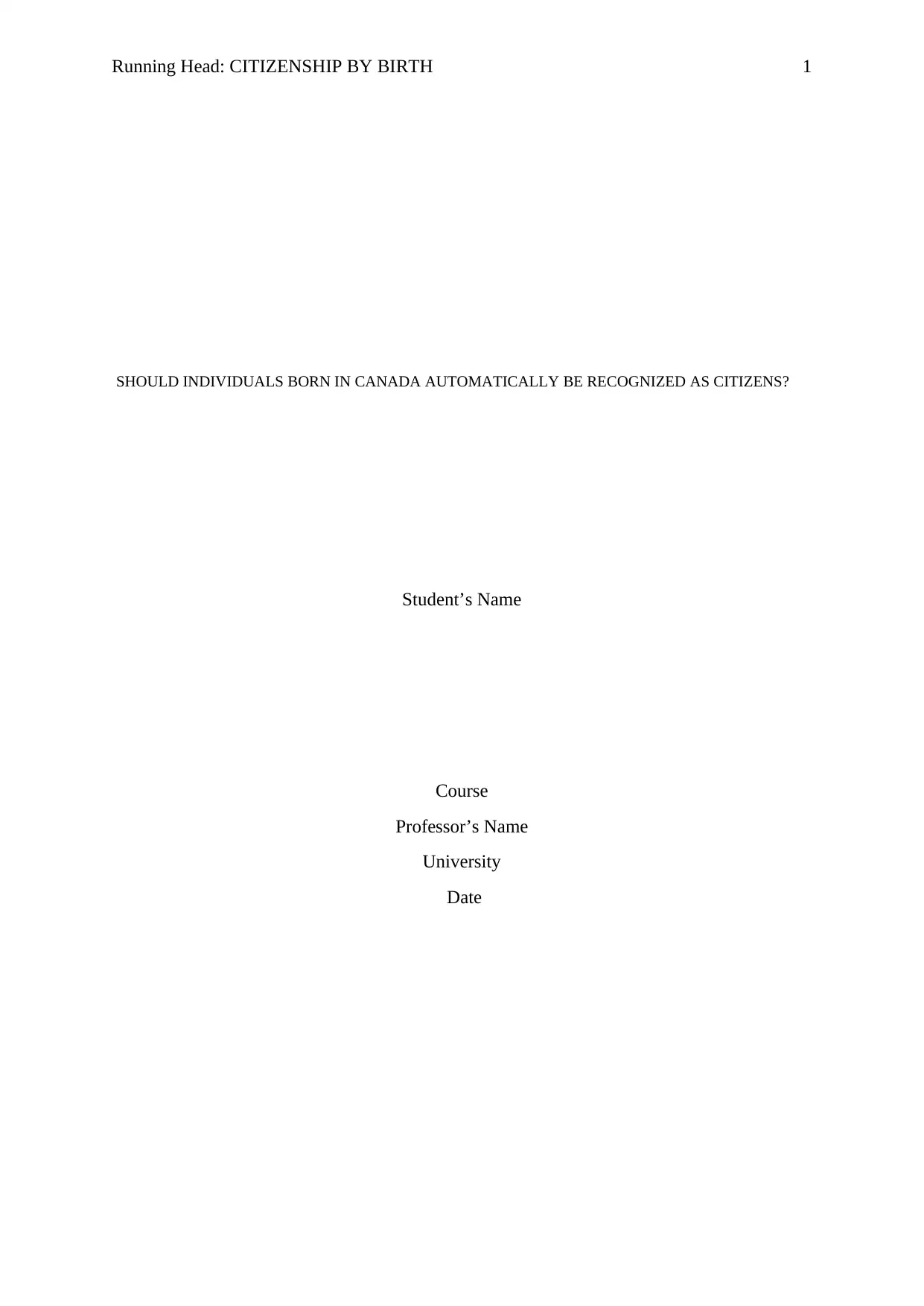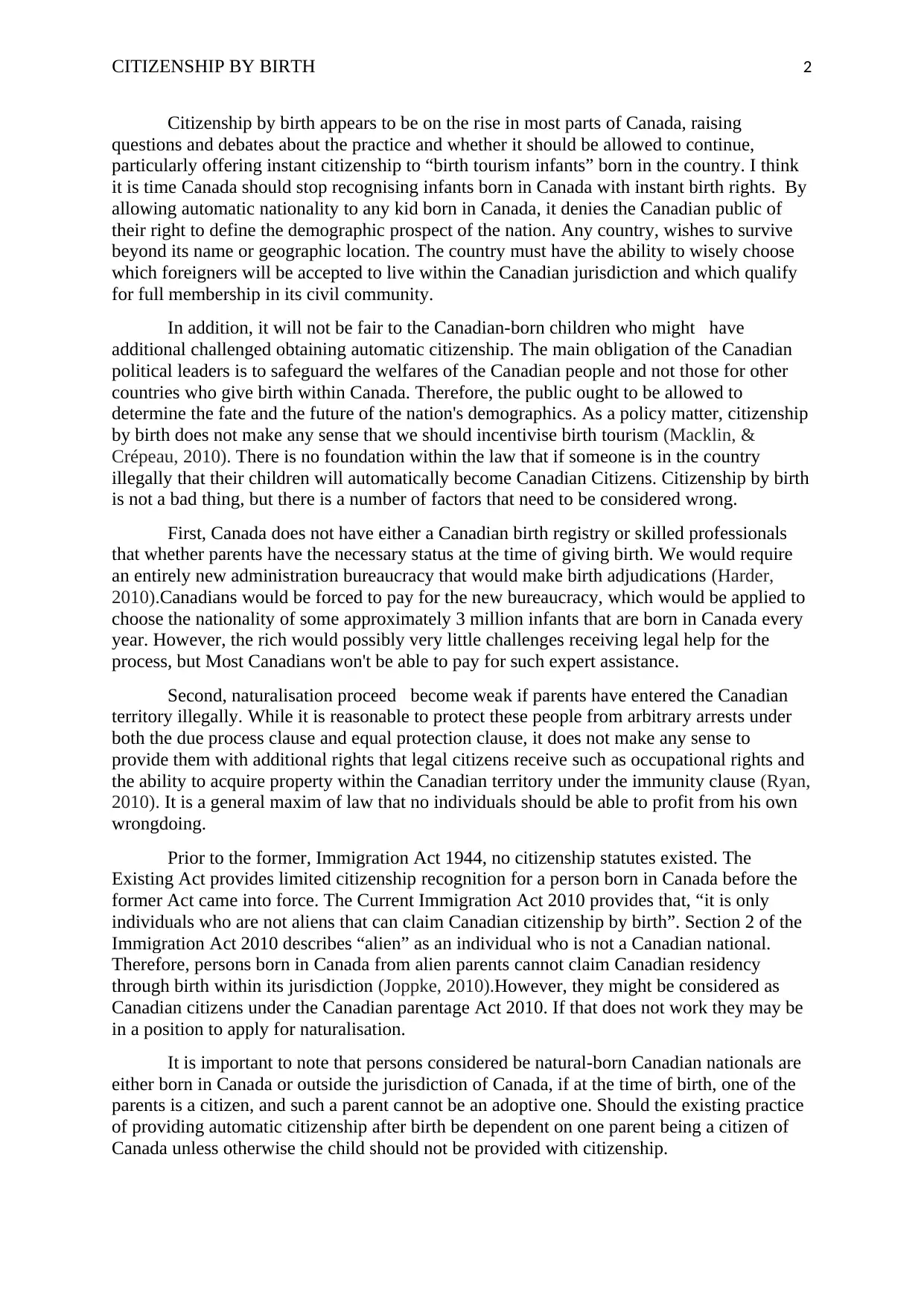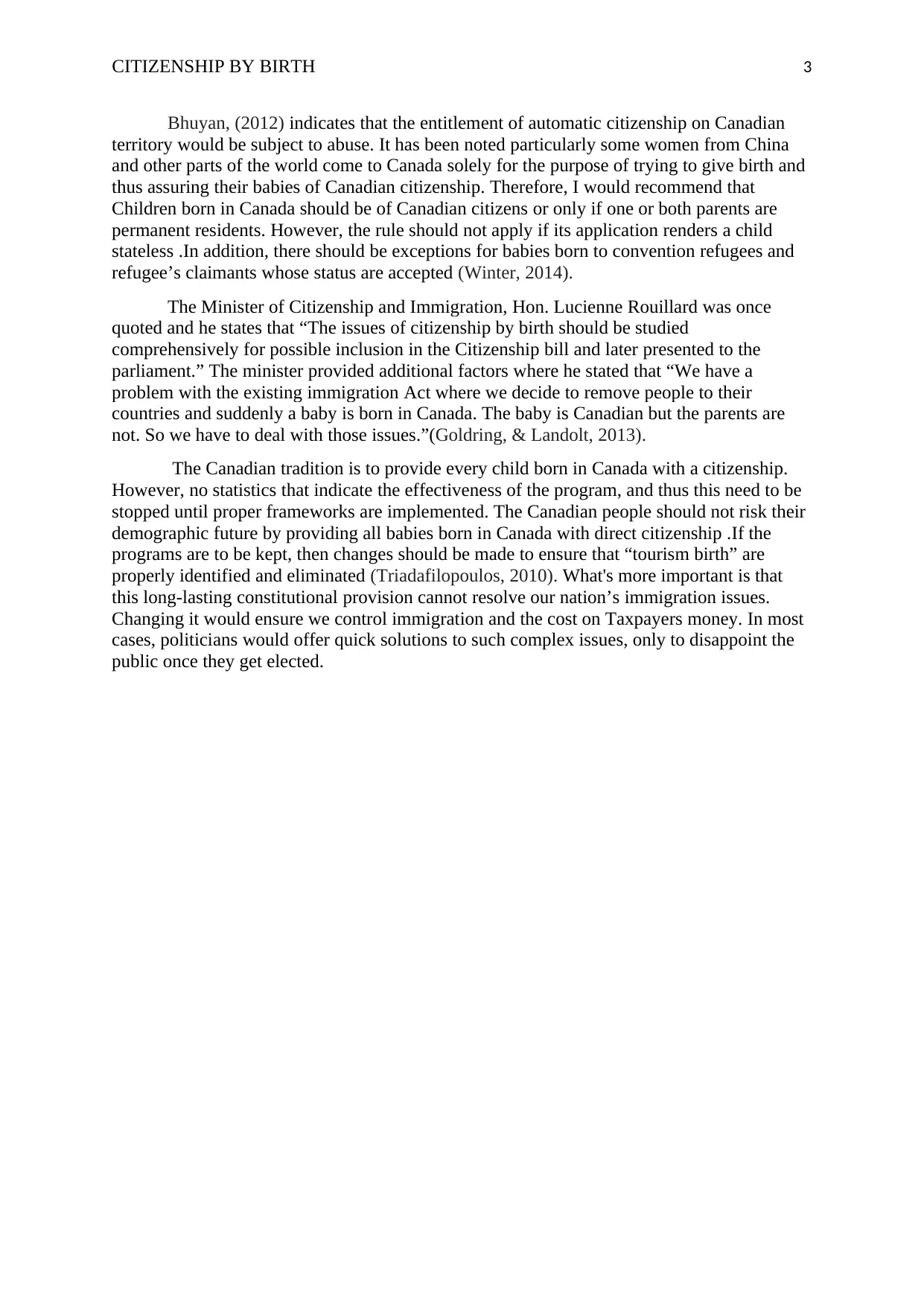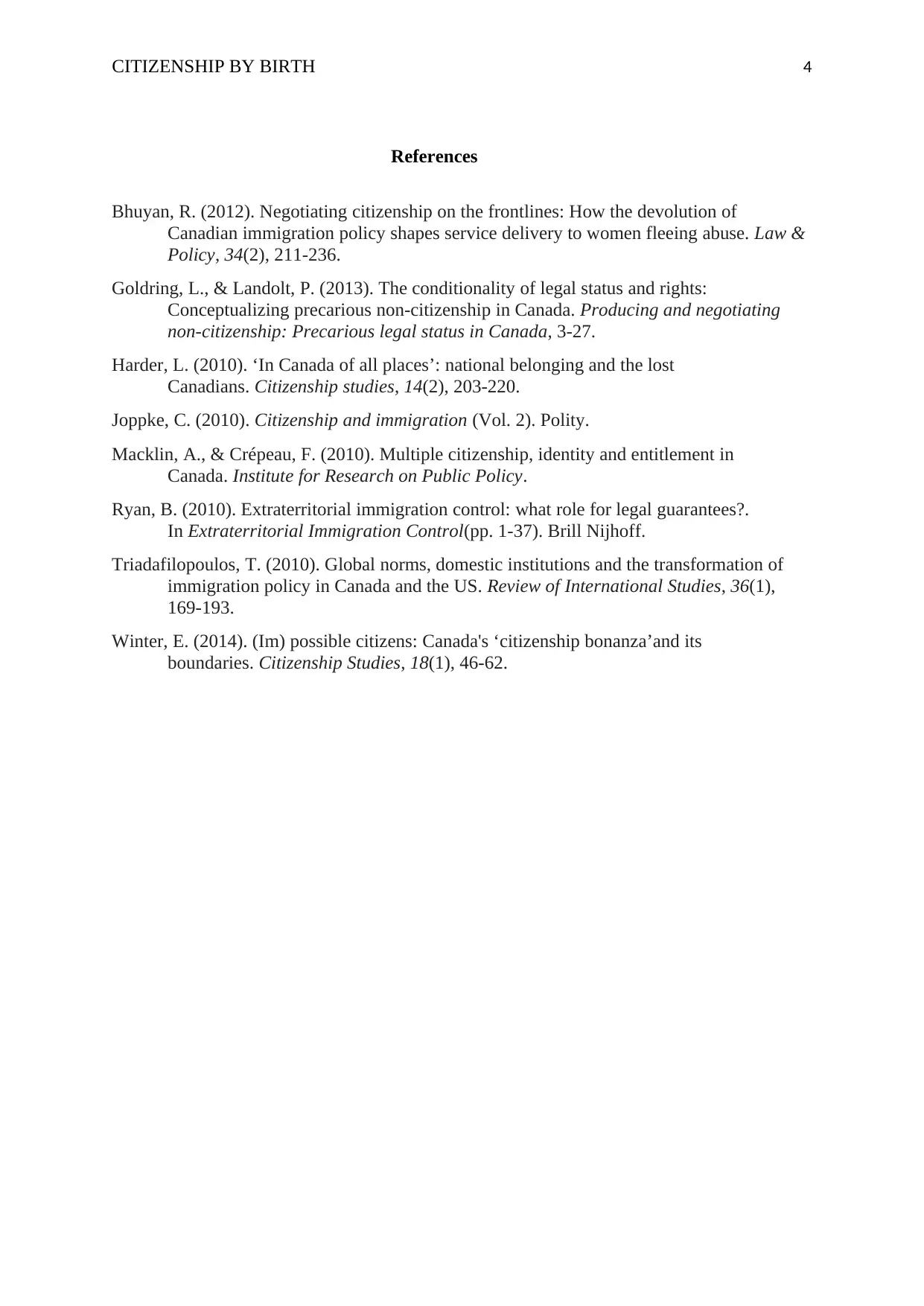Citizenship by Birth: Examining the Canadian Perspective and Policy
VerifiedAdded on 2023/04/20
|4
|1387
|263
Essay
AI Summary
This essay critically analyzes the debate surrounding citizenship by birth in Canada, arguing against the automatic granting of citizenship to infants born in the country. The author contends that such a policy undermines the Canadian public's right to define its demographic future and may incentivize birth tourism. The essay reviews the current immigration laws, including the Immigration Act 2010 and the Canadian parentage Act 2010, and discusses the potential for abuse and the need for policy changes. The author suggests that citizenship should be granted only if one or both parents are permanent residents, with exceptions for stateless children and refugees. The essay references various sources, including academic articles and government statements, to support its arguments and calls for a comprehensive study of the issue for possible inclusion in the Citizenship bill.

Running Head: CITIZENSHIP BY BIRTH 1
SHOULD INDIVIDUALS BORN IN CANADA AUTOMATICALLY BE RECOGNIZED AS CITIZENS?
Student’s Name
Course
Professor’s Name
University
Date
SHOULD INDIVIDUALS BORN IN CANADA AUTOMATICALLY BE RECOGNIZED AS CITIZENS?
Student’s Name
Course
Professor’s Name
University
Date
Paraphrase This Document
Need a fresh take? Get an instant paraphrase of this document with our AI Paraphraser

CITIZENSHIP BY BIRTH 2
Citizenship by birth appears to be on the rise in most parts of Canada, raising
questions and debates about the practice and whether it should be allowed to continue,
particularly offering instant citizenship to “birth tourism infants” born in the country. I think
it is time Canada should stop recognising infants born in Canada with instant birth rights. By
allowing automatic nationality to any kid born in Canada, it denies the Canadian public of
their right to define the demographic prospect of the nation. Any country, wishes to survive
beyond its name or geographic location. The country must have the ability to wisely choose
which foreigners will be accepted to live within the Canadian jurisdiction and which qualify
for full membership in its civil community.
In addition, it will not be fair to the Canadian-born children who might have
additional challenged obtaining automatic citizenship. The main obligation of the Canadian
political leaders is to safeguard the welfares of the Canadian people and not those for other
countries who give birth within Canada. Therefore, the public ought to be allowed to
determine the fate and the future of the nation's demographics. As a policy matter, citizenship
by birth does not make any sense that we should incentivise birth tourism (Macklin, &
Crépeau, 2010). There is no foundation within the law that if someone is in the country
illegally that their children will automatically become Canadian Citizens. Citizenship by birth
is not a bad thing, but there is a number of factors that need to be considered wrong.
First, Canada does not have either a Canadian birth registry or skilled professionals
that whether parents have the necessary status at the time of giving birth. We would require
an entirely new administration bureaucracy that would make birth adjudications (Harder,
2010).Canadians would be forced to pay for the new bureaucracy, which would be applied to
choose the nationality of some approximately 3 million infants that are born in Canada every
year. However, the rich would possibly very little challenges receiving legal help for the
process, but Most Canadians won't be able to pay for such expert assistance.
Second, naturalisation proceed become weak if parents have entered the Canadian
territory illegally. While it is reasonable to protect these people from arbitrary arrests under
both the due process clause and equal protection clause, it does not make any sense to
provide them with additional rights that legal citizens receive such as occupational rights and
the ability to acquire property within the Canadian territory under the immunity clause (Ryan,
2010). It is a general maxim of law that no individuals should be able to profit from his own
wrongdoing.
Prior to the former, Immigration Act 1944, no citizenship statutes existed. The
Existing Act provides limited citizenship recognition for a person born in Canada before the
former Act came into force. The Current Immigration Act 2010 provides that, “it is only
individuals who are not aliens that can claim Canadian citizenship by birth”. Section 2 of the
Immigration Act 2010 describes “alien” as an individual who is not a Canadian national.
Therefore, persons born in Canada from alien parents cannot claim Canadian residency
through birth within its jurisdiction (Joppke, 2010).However, they might be considered as
Canadian citizens under the Canadian parentage Act 2010. If that does not work they may be
in a position to apply for naturalisation.
It is important to note that persons considered be natural-born Canadian nationals are
either born in Canada or outside the jurisdiction of Canada, if at the time of birth, one of the
parents is a citizen, and such a parent cannot be an adoptive one. Should the existing practice
of providing automatic citizenship after birth be dependent on one parent being a citizen of
Canada unless otherwise the child should not be provided with citizenship.
Citizenship by birth appears to be on the rise in most parts of Canada, raising
questions and debates about the practice and whether it should be allowed to continue,
particularly offering instant citizenship to “birth tourism infants” born in the country. I think
it is time Canada should stop recognising infants born in Canada with instant birth rights. By
allowing automatic nationality to any kid born in Canada, it denies the Canadian public of
their right to define the demographic prospect of the nation. Any country, wishes to survive
beyond its name or geographic location. The country must have the ability to wisely choose
which foreigners will be accepted to live within the Canadian jurisdiction and which qualify
for full membership in its civil community.
In addition, it will not be fair to the Canadian-born children who might have
additional challenged obtaining automatic citizenship. The main obligation of the Canadian
political leaders is to safeguard the welfares of the Canadian people and not those for other
countries who give birth within Canada. Therefore, the public ought to be allowed to
determine the fate and the future of the nation's demographics. As a policy matter, citizenship
by birth does not make any sense that we should incentivise birth tourism (Macklin, &
Crépeau, 2010). There is no foundation within the law that if someone is in the country
illegally that their children will automatically become Canadian Citizens. Citizenship by birth
is not a bad thing, but there is a number of factors that need to be considered wrong.
First, Canada does not have either a Canadian birth registry or skilled professionals
that whether parents have the necessary status at the time of giving birth. We would require
an entirely new administration bureaucracy that would make birth adjudications (Harder,
2010).Canadians would be forced to pay for the new bureaucracy, which would be applied to
choose the nationality of some approximately 3 million infants that are born in Canada every
year. However, the rich would possibly very little challenges receiving legal help for the
process, but Most Canadians won't be able to pay for such expert assistance.
Second, naturalisation proceed become weak if parents have entered the Canadian
territory illegally. While it is reasonable to protect these people from arbitrary arrests under
both the due process clause and equal protection clause, it does not make any sense to
provide them with additional rights that legal citizens receive such as occupational rights and
the ability to acquire property within the Canadian territory under the immunity clause (Ryan,
2010). It is a general maxim of law that no individuals should be able to profit from his own
wrongdoing.
Prior to the former, Immigration Act 1944, no citizenship statutes existed. The
Existing Act provides limited citizenship recognition for a person born in Canada before the
former Act came into force. The Current Immigration Act 2010 provides that, “it is only
individuals who are not aliens that can claim Canadian citizenship by birth”. Section 2 of the
Immigration Act 2010 describes “alien” as an individual who is not a Canadian national.
Therefore, persons born in Canada from alien parents cannot claim Canadian residency
through birth within its jurisdiction (Joppke, 2010).However, they might be considered as
Canadian citizens under the Canadian parentage Act 2010. If that does not work they may be
in a position to apply for naturalisation.
It is important to note that persons considered be natural-born Canadian nationals are
either born in Canada or outside the jurisdiction of Canada, if at the time of birth, one of the
parents is a citizen, and such a parent cannot be an adoptive one. Should the existing practice
of providing automatic citizenship after birth be dependent on one parent being a citizen of
Canada unless otherwise the child should not be provided with citizenship.

CITIZENSHIP BY BIRTH 3
Bhuyan, (2012) indicates that the entitlement of automatic citizenship on Canadian
territory would be subject to abuse. It has been noted particularly some women from China
and other parts of the world come to Canada solely for the purpose of trying to give birth and
thus assuring their babies of Canadian citizenship. Therefore, I would recommend that
Children born in Canada should be of Canadian citizens or only if one or both parents are
permanent residents. However, the rule should not apply if its application renders a child
stateless .In addition, there should be exceptions for babies born to convention refugees and
refugee’s claimants whose status are accepted (Winter, 2014).
The Minister of Citizenship and Immigration, Hon. Lucienne Rouillard was once
quoted and he states that “The issues of citizenship by birth should be studied
comprehensively for possible inclusion in the Citizenship bill and later presented to the
parliament.” The minister provided additional factors where he stated that “We have a
problem with the existing immigration Act where we decide to remove people to their
countries and suddenly a baby is born in Canada. The baby is Canadian but the parents are
not. So we have to deal with those issues.”(Goldring, & Landolt, 2013).
The Canadian tradition is to provide every child born in Canada with a citizenship.
However, no statistics that indicate the effectiveness of the program, and thus this need to be
stopped until proper frameworks are implemented. The Canadian people should not risk their
demographic future by providing all babies born in Canada with direct citizenship .If the
programs are to be kept, then changes should be made to ensure that “tourism birth” are
properly identified and eliminated (Triadafilopoulos, 2010). What's more important is that
this long-lasting constitutional provision cannot resolve our nation’s immigration issues.
Changing it would ensure we control immigration and the cost on Taxpayers money. In most
cases, politicians would offer quick solutions to such complex issues, only to disappoint the
public once they get elected.
Bhuyan, (2012) indicates that the entitlement of automatic citizenship on Canadian
territory would be subject to abuse. It has been noted particularly some women from China
and other parts of the world come to Canada solely for the purpose of trying to give birth and
thus assuring their babies of Canadian citizenship. Therefore, I would recommend that
Children born in Canada should be of Canadian citizens or only if one or both parents are
permanent residents. However, the rule should not apply if its application renders a child
stateless .In addition, there should be exceptions for babies born to convention refugees and
refugee’s claimants whose status are accepted (Winter, 2014).
The Minister of Citizenship and Immigration, Hon. Lucienne Rouillard was once
quoted and he states that “The issues of citizenship by birth should be studied
comprehensively for possible inclusion in the Citizenship bill and later presented to the
parliament.” The minister provided additional factors where he stated that “We have a
problem with the existing immigration Act where we decide to remove people to their
countries and suddenly a baby is born in Canada. The baby is Canadian but the parents are
not. So we have to deal with those issues.”(Goldring, & Landolt, 2013).
The Canadian tradition is to provide every child born in Canada with a citizenship.
However, no statistics that indicate the effectiveness of the program, and thus this need to be
stopped until proper frameworks are implemented. The Canadian people should not risk their
demographic future by providing all babies born in Canada with direct citizenship .If the
programs are to be kept, then changes should be made to ensure that “tourism birth” are
properly identified and eliminated (Triadafilopoulos, 2010). What's more important is that
this long-lasting constitutional provision cannot resolve our nation’s immigration issues.
Changing it would ensure we control immigration and the cost on Taxpayers money. In most
cases, politicians would offer quick solutions to such complex issues, only to disappoint the
public once they get elected.
⊘ This is a preview!⊘
Do you want full access?
Subscribe today to unlock all pages.

Trusted by 1+ million students worldwide

CITIZENSHIP BY BIRTH 4
References
Bhuyan, R. (2012). Negotiating citizenship on the frontlines: How the devolution of
Canadian immigration policy shapes service delivery to women fleeing abuse. Law &
Policy, 34(2), 211-236.
Goldring, L., & Landolt, P. (2013). The conditionality of legal status and rights:
Conceptualizing precarious non-citizenship in Canada. Producing and negotiating
non-citizenship: Precarious legal status in Canada, 3-27.
Harder, L. (2010). ‘In Canada of all places’: national belonging and the lost
Canadians. Citizenship studies, 14(2), 203-220.
Joppke, C. (2010). Citizenship and immigration (Vol. 2). Polity.
Macklin, A., & Crépeau, F. (2010). Multiple citizenship, identity and entitlement in
Canada. Institute for Research on Public Policy.
Ryan, B. (2010). Extraterritorial immigration control: what role for legal guarantees?.
In Extraterritorial Immigration Control(pp. 1-37). Brill Nijhoff.
Triadafilopoulos, T. (2010). Global norms, domestic institutions and the transformation of
immigration policy in Canada and the US. Review of International Studies, 36(1),
169-193.
Winter, E. (2014). (Im) possible citizens: Canada's ‘citizenship bonanza’and its
boundaries. Citizenship Studies, 18(1), 46-62.
References
Bhuyan, R. (2012). Negotiating citizenship on the frontlines: How the devolution of
Canadian immigration policy shapes service delivery to women fleeing abuse. Law &
Policy, 34(2), 211-236.
Goldring, L., & Landolt, P. (2013). The conditionality of legal status and rights:
Conceptualizing precarious non-citizenship in Canada. Producing and negotiating
non-citizenship: Precarious legal status in Canada, 3-27.
Harder, L. (2010). ‘In Canada of all places’: national belonging and the lost
Canadians. Citizenship studies, 14(2), 203-220.
Joppke, C. (2010). Citizenship and immigration (Vol. 2). Polity.
Macklin, A., & Crépeau, F. (2010). Multiple citizenship, identity and entitlement in
Canada. Institute for Research on Public Policy.
Ryan, B. (2010). Extraterritorial immigration control: what role for legal guarantees?.
In Extraterritorial Immigration Control(pp. 1-37). Brill Nijhoff.
Triadafilopoulos, T. (2010). Global norms, domestic institutions and the transformation of
immigration policy in Canada and the US. Review of International Studies, 36(1),
169-193.
Winter, E. (2014). (Im) possible citizens: Canada's ‘citizenship bonanza’and its
boundaries. Citizenship Studies, 18(1), 46-62.
1 out of 4
Your All-in-One AI-Powered Toolkit for Academic Success.
+13062052269
info@desklib.com
Available 24*7 on WhatsApp / Email
![[object Object]](/_next/static/media/star-bottom.7253800d.svg)
Unlock your academic potential
Copyright © 2020–2025 A2Z Services. All Rights Reserved. Developed and managed by ZUCOL.

